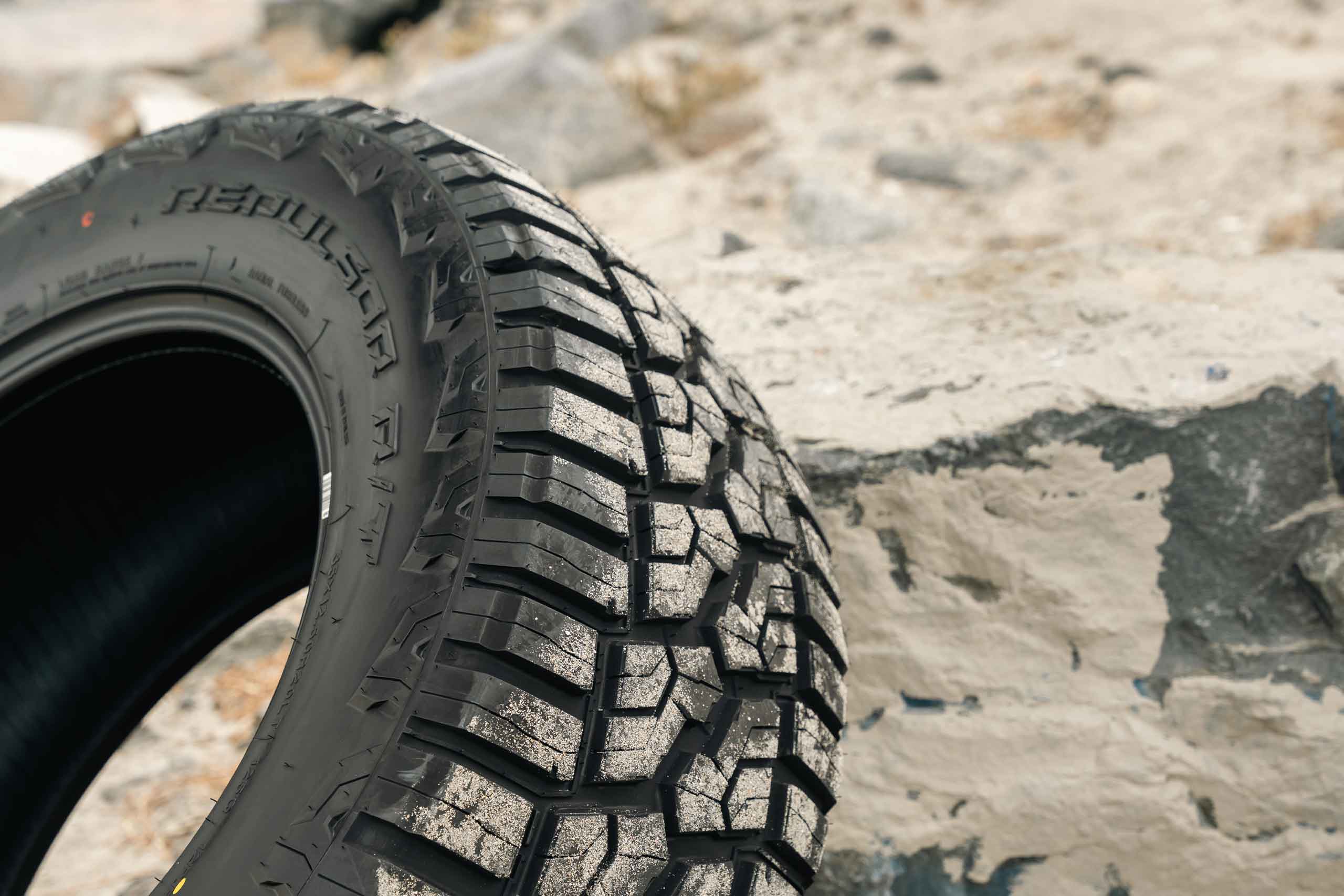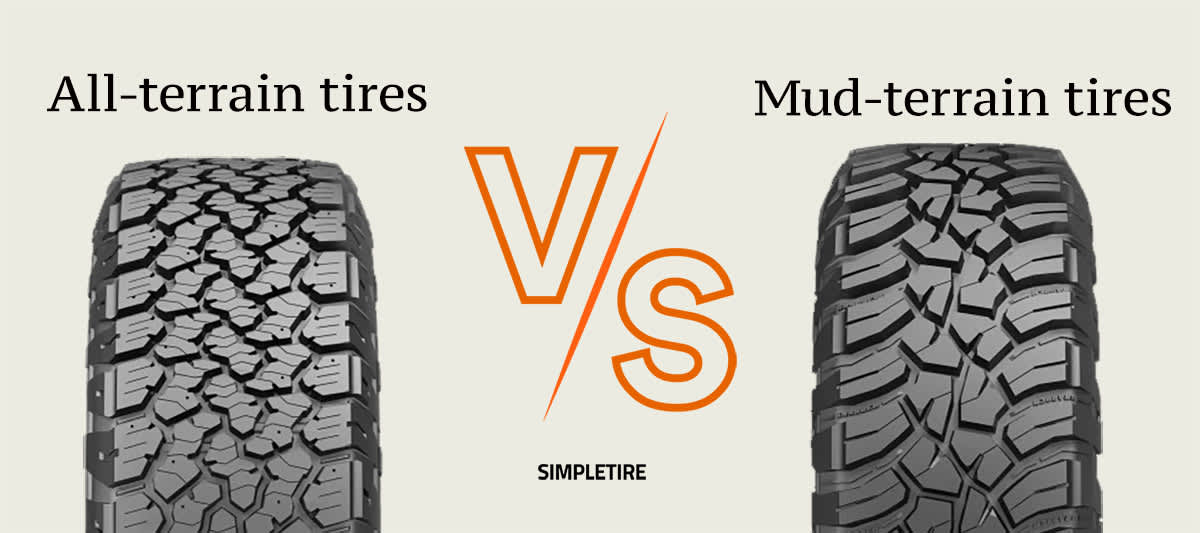Tire Buying Guides
Free shipping
Best price guarantee
Special pricing
Financing with Resolve
Easy returns
Free shipping
Best price guarantee
Special pricing
Financing with Resolve
Easy returns
Tire Buying Guides

All-terrain tires bridge the gap between highway comfort and off-road capability, offering drivers a versatile solution for varied driving conditions. These specialized tires have gained popularity among truck and SUV owners who need reliable performance whether commuting on city streets or exploring weekend trails.
The unique construction of all-terrain tires sets them apart from standard highway tires through reinforced sidewalls and aggressive tread patterns. This engineering allows them to handle everything from wet pavement to gravel roads while maintaining reasonable on-road manners that pure off-road tires cannot match.
Understanding all-terrain tire technology helps drivers make informed decisions about whether these versatile tires suit their specific needs. The balance between durability, traction, and daily drivability makes them an attractive option for many vehicle owners seeking one tire solution for multiple driving scenarios.
All-terrain tires represent a carefully engineered compromise between the smooth ride of highway tires and the rugged capability of dedicated off-road tires. These versatile tires feature interlocking tread patterns with wider channels between tread blocks — a design that allows them to grip loose surfaces like gravel, dirt, and mud while still providing stable performance on paved roads. The tread blocks work together to create multiple biting edges that enhance traction across various surfaces, from rain-slicked highways to rocky trails.
The construction of all-terrain tires goes beyond surface-level design. Manufacturers build these tires with tougher rubber compounds and more durable internal structures than standard passenger tires. This robust construction typically includes multiple ply layers, reinforced steel belt packages, and sidewalls engineered to resist punctures and cuts from rocks or debris. Some premium models even incorporate materials like DuPont Kevlar — the same fiber used in bulletproof vests — within their belt layers for exceptional durability.
The engineering behind all-terrain tires focuses on five critical elements that distinguish them from other tire types:
The internal construction matches the external toughness with features designed for demanding use. High-tensile steel belts provide stability at highway speeds while resisting deformation under heavy loads. The carcass uses polyester or nylon cords arranged in multiple plies — often two or three layers — creating a foundation strong enough to handle the stress of off-road driving. This multi-layer approach distributes impact forces across the tire structure, reducing the risk of punctures or sidewall failures that could leave drivers stranded far from help.
All-terrain tires are built for versatility, designed to tackle both rough terrains and regular roads. They feature deep grooves and open tread blocks that enhance grip on unpaved surfaces. This makes them ideal for drivers who transition between highways and trails. However, this design can lead to increased noise levels during highway travel.
All-season tires prioritize a smooth and quiet ride. They are optimized for efficiency and comfort on paved surfaces, providing excellent handling in both dry and wet conditions. These tires are best suited for urban and suburban driving, where road noise and fuel economy are key considerations.
Winter tires are engineered for extreme cold, featuring specialized compounds and patterns for superior grip on ice and snow. All-terrain tires with the 3PMSF rating offer reliable performance in light snow, making them suitable for moderate winters without the need for seasonal changes.
When it comes to stopping distances, winter tires excel in snowy conditions, requiring significantly less distance to stop. Despite this, all-terrain tires provide a practical option for drivers in regions with mild winter weather, offering year-round usability.

Mud-terrain tires excel in challenging off-road environments, designed for deep mud and rocky paths. Their aggressive patterns offer exceptional traction but often compromise on-road comfort and fuel efficiency.
All-terrain tires strike a balance between rugged off-road capability and smooth highway performance. They are less noisy and more fuel-efficient than mud-terrain tires, making them suitable for those who require a tire for both everyday driving and occasional off-road adventures.
All-terrain tires are essential for drivers who need reliable performance across diverse terrains. Light trucks and pickup trucks, often handling heavy loads and varied routes, benefit from the robust features of A/T tires. These tires provide the durability and traction necessary for both work-related tasks and recreational activities.
For SUVs and crossovers, all-terrain tires offer the perfect blend of on-road comfort and off-road capability. They ensure stability and grip whether you’re navigating city streets or exploring rural paths. The construction of A/T tires supports vehicles that occasionally venture off paved roads, such as 4-wheel drive models. Campers and RVs, which frequently carry heavy loads over different terrains, also find these tires advantageous due to their strength and load-bearing capacity.
Drivers who frequently transition between smooth highways and rugged trails find all-terrain tires indispensable. These tires cater to those who require dependable performance without the need for frequent tire changes. Outdoor enthusiasts who enjoy camping, fishing, or exploring benefit from the enhanced grip of A/T tires, even if they avoid extreme off-roading.
Residents in areas with variable weather, including occasional snow, appreciate the practicality of all-terrain tires. They offer consistent performance throughout the year, eliminating the need for seasonal swaps. Additionally, vehicle owners seeking a distinctive look without compromising everyday usability find A/T tires appealing, as they combine aesthetics with functionality.
All-terrain tires excel by offering reliable traction on varied surfaces such as wet roads, gravel, dirt, and light snow. Their specialized tread design features deep patterns and wide grooves, enhancing grip and ensuring stability across different terrains. Many models include a 3PMSF winter rating, making them suitable for moderate snow conditions without needing seasonal changes.
These tires are built to withstand tough conditions, providing robust protection against punctures. The sturdy construction defends against sharp objects and challenging terrains, ensuring durability beyond standard highway tires. The innovative tread design prevents debris from collecting, maintaining optimal performance by keeping the treads clear of mud and stones.
All-terrain tires stand out for their year-round functionality, removing the hassle of switching tires for different seasons. Their durable design results in a longer lifespan compared to mud-terrain tires, offering a cost-effective solution for drivers facing varied driving conditions.
The reinforced build of all-terrain tires supports heavy loads and towing, delivering confidence in unpredictable weather or road scenarios. This durability ensures that drivers can rely on their tires for a multitude of driving needs, providing stability and performance on every journey.
All-terrain tires, while versatile, come with certain trade-offs. The rugged tread pattern that excels off-road may lead to increased road noise during highway drives. This can be a concern for those who prefer a quieter experience.
These tires can also affect fuel efficiency. The design leads to more rolling resistance, potentially reducing miles per gallon compared to regular tires. Additionally, the robust construction that aids in off-road durability can result in a firmer ride on smooth surfaces, impacting comfort.
All-terrain tires often require a higher initial investment. The advanced materials and design contribute to a price above standard options. Despite their strength, these tires may wear faster, with warranties typically ranging from 40,000 to 50,000 miles.
Consistent upkeep is essential to extend the life of these tires. They might be prone to uneven wear patterns, needing regular rotation to mitigate issues. The aggressive tread could also demand more frequent pressure checks to maintain optimal performance and safety.
All-terrain tires are crafted with a unique tread layout that enhances versatility. The tread blocks are designed with a staggered pattern that improves grip on uneven surfaces such as dirt paths. This arrangement ensures the tire maintains contact with the ground, boosting stability in a variety of conditions.
Wide grooves play a crucial role in channeling away mud and snow, preventing buildup. This design keeps the tread clear, maintaining effective traction. Additionally, fine cuts, known as siping, are integrated to enhance grip on wet and snowy surfaces, ensuring reliable performance in adverse weather.
To further protect the tire, features like debris ejectors help prevent stones from becoming lodged in the treads. This not only protects the tire from damage but also ensures consistent performance. The shoulder tread extends over the sidewalls, providing additional protection against off-road obstacles and contributing to the tire’s overall durability.
The construction of all-terrain tires is engineered for strength and resilience. Layers of durable materials are used to enhance resistance to punctures, ensuring the tire can endure challenging terrains. These layers distribute pressure evenly, minimizing the risk of damage.
Steel belts are incorporated to maintain the tire’s shape and stability, even at high speeds, ensuring a smooth ride. The tire’s rubber compound is specially formulated to balance durability with traction, allowing it to adapt to various road conditions without excessive wear.
Some models include advanced compounds that resist cuts and chips, extending the tire’s life. With a range of load capacities available, these tires can accommodate different vehicle needs, from daily commuting to heavy-duty applications, making them a versatile choice for a wide range of drivers.
All-terrain tires excel for drivers who regularly navigate varied terrains. If your travels include a significant amount of unpaved or gravel roads, these tires offer the necessary traction and robustness. In regions with unpredictable weather, all-terrain tires provide dependable performance without needing seasonal swaps.
For vehicles tasked with carrying heavy loads or towing, the durability of all-terrain tires ensures stability and safety. They are ideal for drivers who want the flexibility of off-road capability while maintaining everyday usability.
When choosing all-terrain tires, look for the 3PMSF rating to ensure winter capability. This mark indicates that the tire can handle snowy conditions effectively. It’s important to compare tread warranties, which can range significantly, offering insights into expected tire life.
Confirm that the tires meet your vehicle's requirements for load and speed ratings to ensure best performance. If a quiet ride is essential, consider the tire's noise level. Reading reviews tailored to specific driving conditions offers valuable insights from other drivers.
Consider the overall costs, including potential impacts on fuel efficiency. All-terrain tires might have higher rolling resistance, which can affect fuel consumption. Evaluating these factors will guide you to a decision that suits your driving habits and needs.
All-terrain tires offer the perfect balance of capability and comfort for drivers who refuse to let road conditions limit their adventures. Whether you're navigating muddy trails on weekends or commuting through winter weather, these versatile tires provide the confidence and control you need for every journey. When you're ready to upgrade your vehicle's performance, we invite you to shop for tires online and find the best deals with us.
Search By